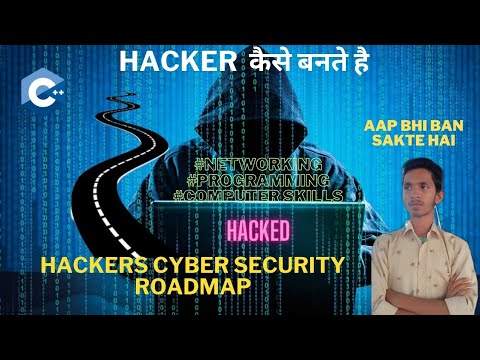Hacker कैसे बनते हैं l आप भी बन सकते हैं 2024 Complete Roadmap Hindi @CyShyamNetwork
Becoming an ethical hacker, also known as a white hat hacker or penetration tester, involves a structured learning process and a commitment to ethical practices. Here is a roadmap to help you get started on your journey to becoming an ethical hacker:
join WhatsApp Channel
https://whatsapp.com/channel/0029VaCaB40KgsNwyPW9vw1o
watch complete Lab access
Cisco CCNA(200-301) 101 Lab Full Course Playlist: https://www.youtube.com/playlist?list=PLzwjP4VeS840KZOPuhys0Wp1xDg80eRcu
https://tryhackme.com/
Computer Hardware Full course playlist
Computer Hardware Full Course Playlist: https://www.youtube.com/playlist?list=PLzwjP4VeS841uJl_JMGgVrL6QiGoeATK8
Networking Full course Theory
Cisco CCNA NETWORKING Full Course Theory: https://www.youtube.com/playlist?list=PLzwjP4VeS842uQtMMcRqgsj4iMTERvWMp
Computer Hardware Full course in one video
**1. Learn the Basics:**
– Start with a solid foundation in computer science, networking, and cybersecurity.
– Understand operating systems (Linux, Windows), networking protocols, and the basics of programming (Python, C, or scripting languages).
**2. Obtain a Relevant Degree or Certification:**
– Many ethical hackers hold degrees in computer science, information security, or related fields.
– Consider pursuing certifications like CompTIA Security+, Certified Information Systems Security Professional (CISSP), Certified Ethical Hacker (CEH), and Offensive Security Certified Professional (OSCP).
**3. Gain Hands-On Experience:**
– Set up a lab environment to practice and experiment with ethical hacking techniques.
– Learn to use tools like Kali Linux, Wireshark, Nmap, Metasploit, and Burp Suite.
**4. Study Networking and Web Technologies:**
– Gain in-depth knowledge of TCP/IP, DNS, HTTP, and other core networking and web technologies.
– Understand how firewalls, routers, and switches work.
**5. Explore Different Hacking Domains:**
– Ethical hacking covers various domains, such as network penetration testing, web application security, wireless network security, and more.
– Specialize in areas that interest you and align with your career goals.
**6. Learn About Vulnerabilities and Exploits:**
– Study common vulnerabilities and exploits (e.g., buffer overflows, SQL injection, cross-site scripting) and how to mitigate them.
– Stay updated with the latest threats and vulnerabilities.
**7. Develop Programming and Scripting Skills:**
– Learn programming languages to write custom tools and scripts for penetration testing.
– Python is a popular choice due to its versatility in security applications.
**8. Understand Operating Systems:**
– Be proficient in various operating systems (Windows, Linux, macOS) to identify and exploit vulnerabilities.
**9. Learn Web Application Security:**
– Gain expertise in web application security by understanding OWASP’s Top Ten vulnerabilities, web frameworks, and security best practices.
**10. Get Certified:**
– Obtain relevant certifications, such as CEH, OSCP, or others, to validate your skills and knowledge.
**11. Join Online Communities:**
– Participate in ethical hacking forums and communities to connect with like-minded individuals and stay updated on industry trends.
**12. Responsible Disclosure:**
– Learn about responsible disclosure practices, which involve reporting vulnerabilities to the affected organizations rather than exploiting them maliciously.
**13. Build a Portfolio:**
– Document your ethical hacking projects and achievements to showcase your skills to potential employers or clients.
**14. Look for Entry-Level Positions:**
– Start your career as a security analyst, junior penetration tester, or a related entry-level role to gain professional experience.
**15. Stay Current:**
– Cybersecurity is a rapidly evolving field, so continuous learning is essential. Stay informed about emerging threats, tools, and best practices.
**16. Pursue Advanced Certifications:**
– Consider advanced certifications such as Certified Information Systems Security Professional (CISSP), Certified Information Security Manager (CISM), or Certified Information Systems Auditor (CISA).
**17. Network and Collaborate:**
– Attend cybersecurity conferences, join professional organizations, and network with industry experts.
**18. Act Ethically:**
– Always conduct ethical hacking within legal and ethical boundaries. Obtain proper authorization before testing systems.
Becoming an ethical hacker requires dedication, continuous learning, and a commitment to ethical conduct. Your expertise will be in high demand as organizations seek to protect their digital assets in an increasingly interconnected world.
#technology #tech #techno #hindi #quicklearn #tricks #computer #video
by CyShyam Network
linux foundation




Very useful information video